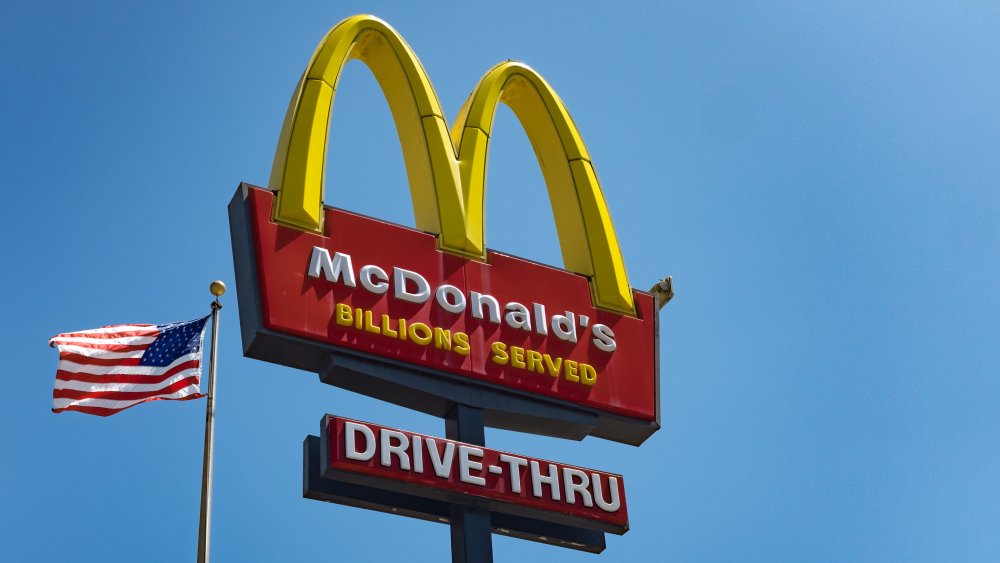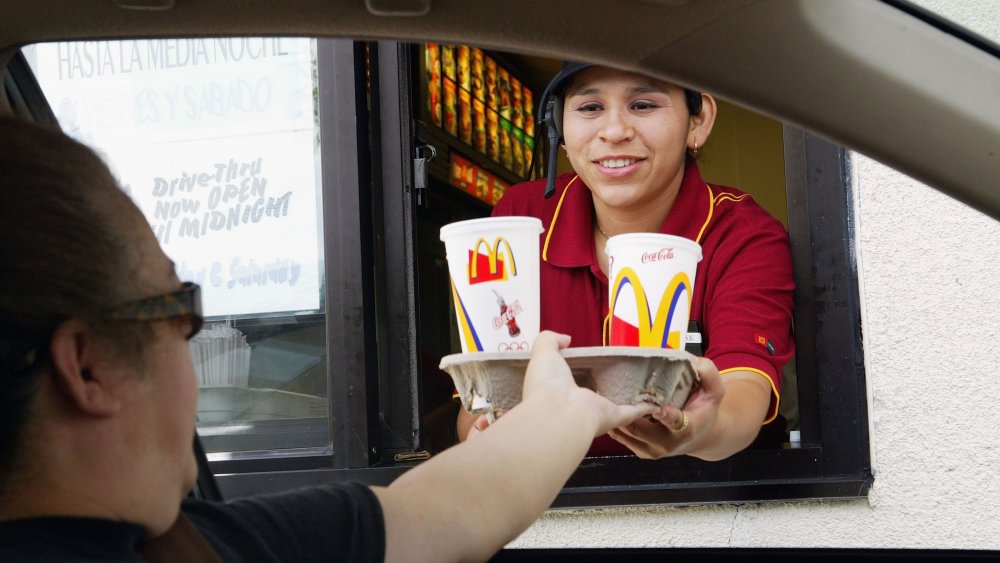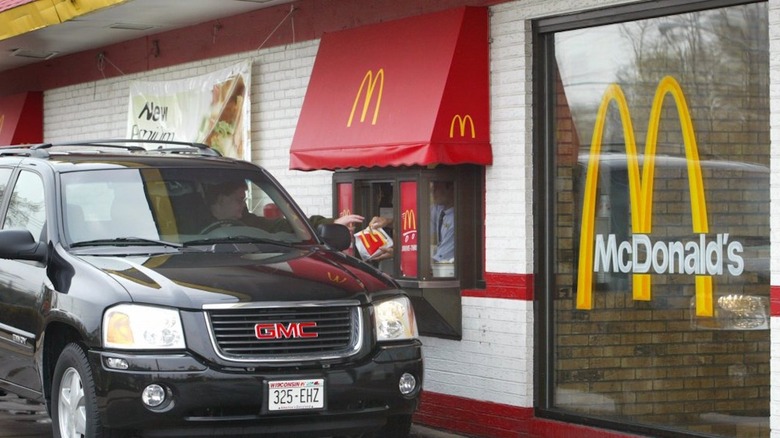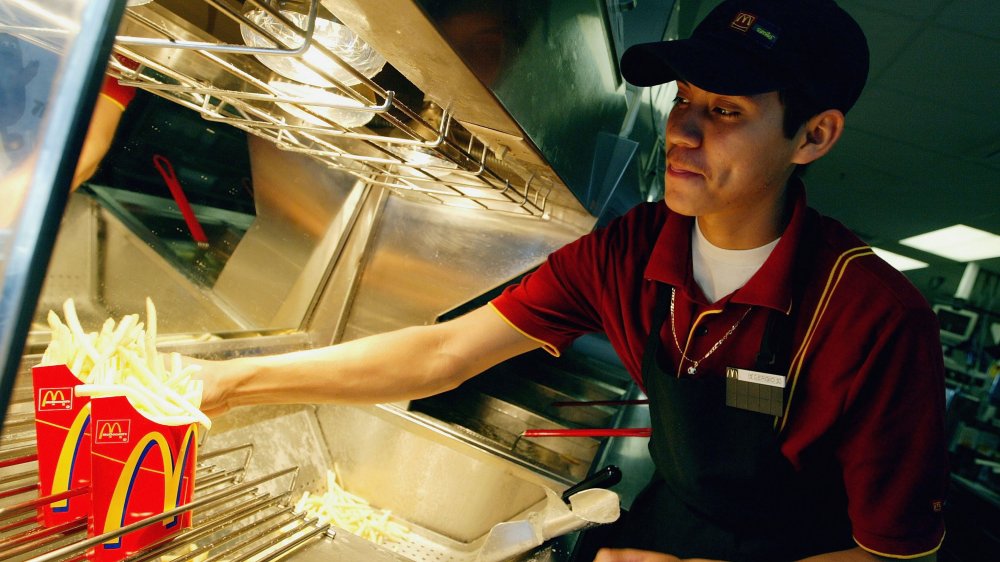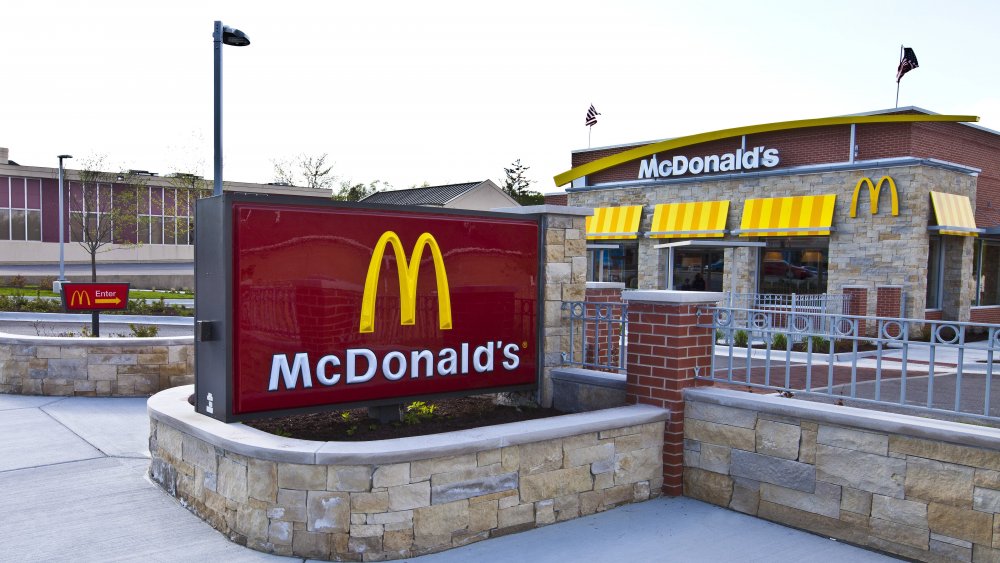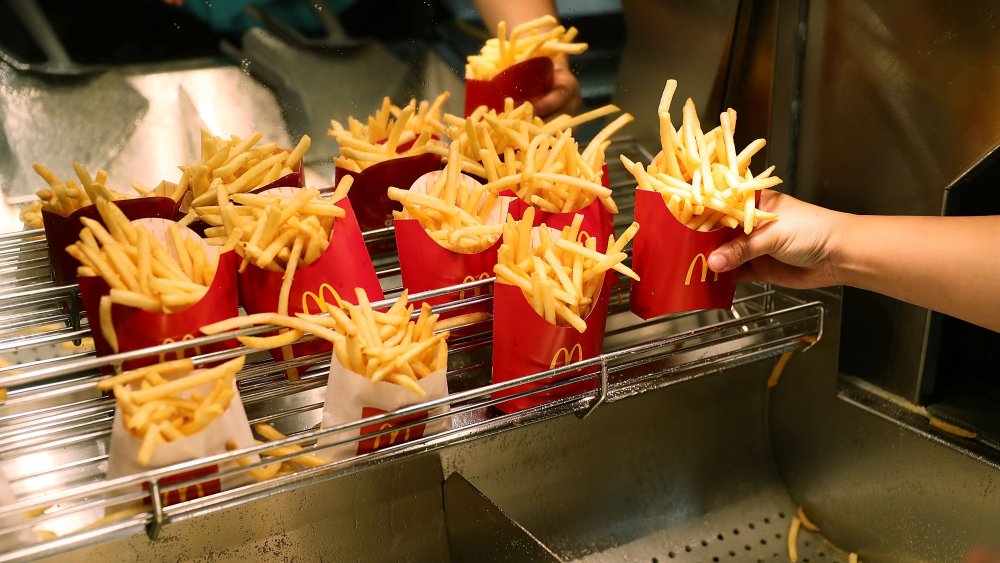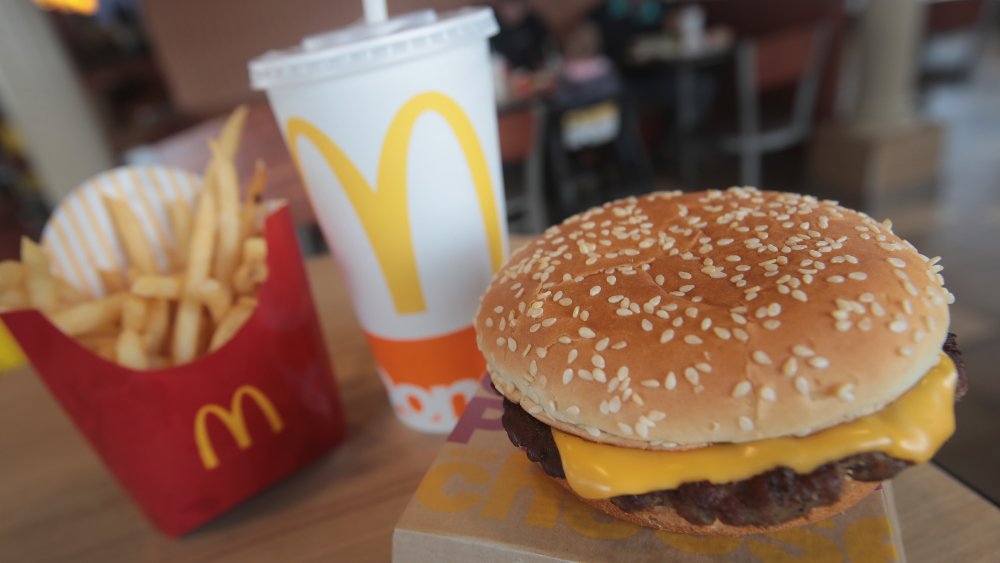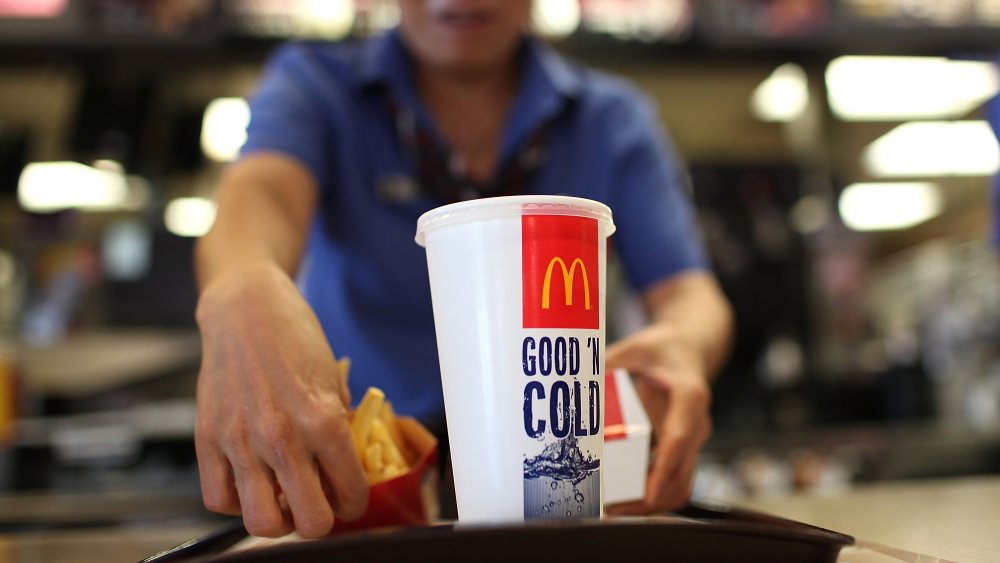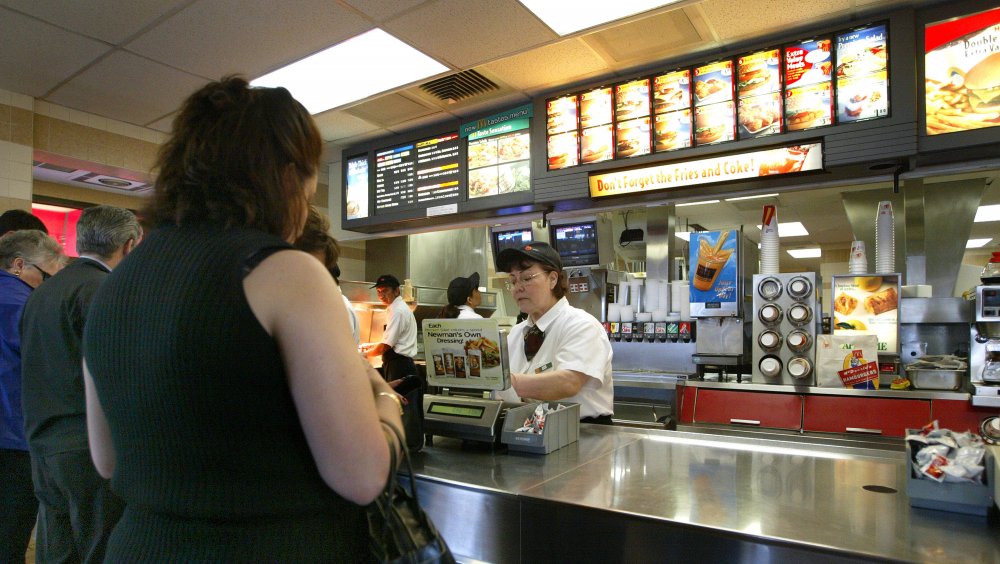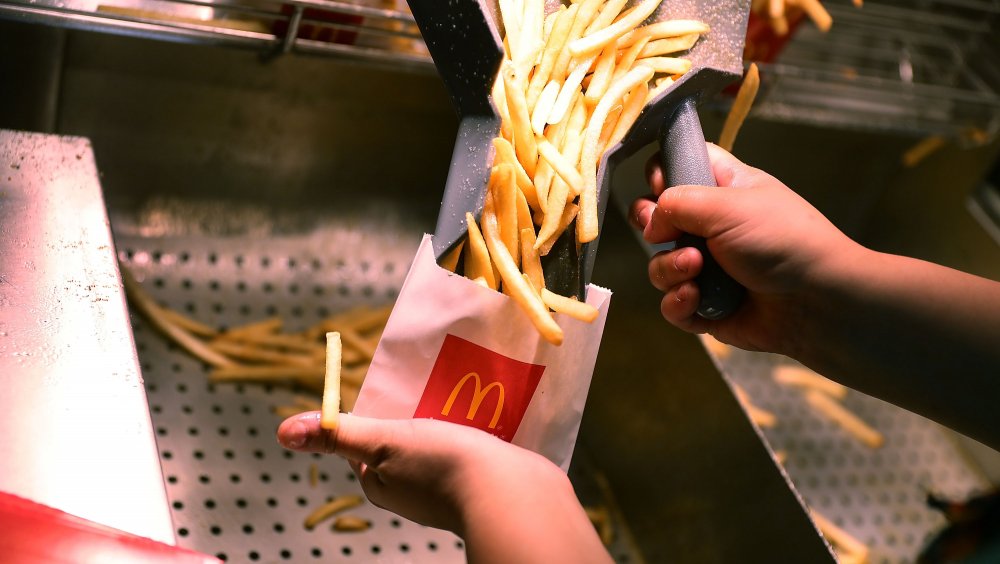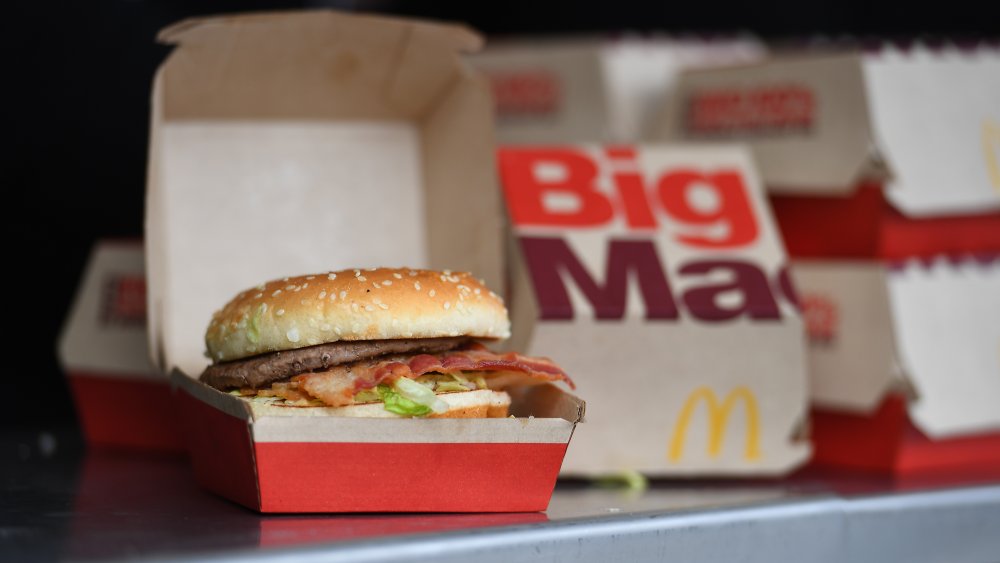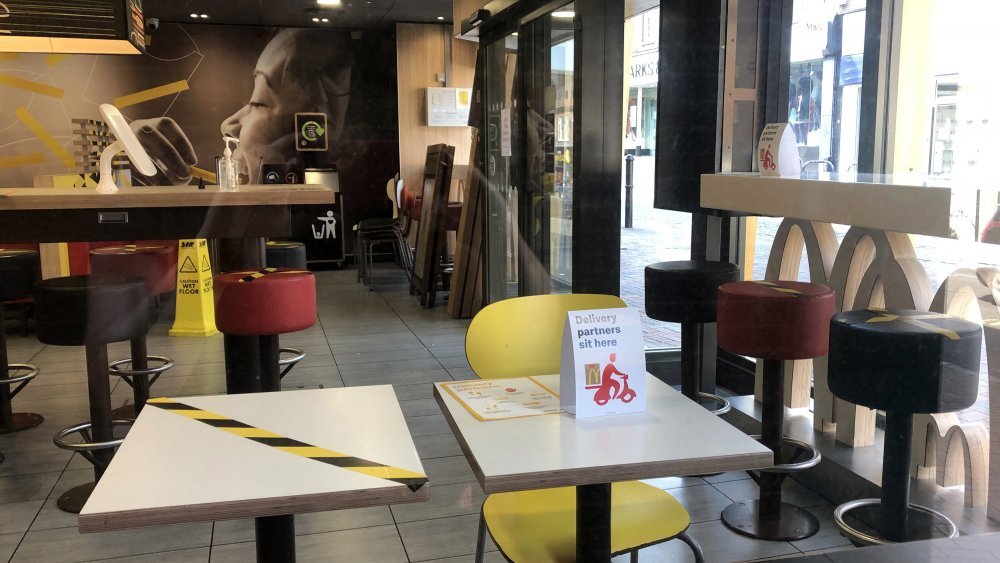Shady Things McDonald's Tried To Hide From Their Employees
There are few brands in existence today that are more ubiquitous than McDonald's. What started as one humble fast food burger joint back in 1954 has grown into a modern-day empire, employing an astonishing number of workers (Forbes estimated nearly two million, including franchises) at close to 37,000 locations around the world. We're willing to bet you can't find a single person who hasn't heard of, if not eaten at, a McDonald's at some point in their lives.
But you don't become one of the largest and by far the most valuable fast food chain in the world without collecting a few skeletons in your closet. And while it may be the home of the Happy Meal, let's just say things are not always glowing under the Golden Arches of McDonald's. The company has been known to try and keep some dark secrets from customers, including how clean and fresh some of its food may be. But it's not just us hungry, oblivious burger seekers who are being kept in the dark. Keep reading for more on the shady things McDonald's tries to hide from their own employees.
McDonald's wages are not enough to live on
McDonald's promises prospective workers the "opportunity to build a successful future with the perks and flexibility of a side gig." But in reality, the company just seems to pay like a side gig. According to Glassdoor, the average base pay for a McDonald's worker is $10 per hour. Some have reported being paid as low as $8.50 an hour when starting out, just above the federal minimum wage. That shakes out to about $20,000 a year or less if working full-time. These numbers are well below the estimated living wage for Americans in 2019, which is $16.54 an hour.
McDonald's has proven they are aware of this deficit. In 2013, in what turned out to be a major PR fail, the company decided to publish a sample budget to teach employees how to manage their finances on a McDonald's salary. The move immediately garnered outrage and criticism for several reasons. For one, the budget assumed that employees were working two jobs. It also did not account for basic needs, including child care, groceries, clothing, and gas. On top of that, the budget allotted only $20 per month for health insurance costs, which actually average out to way more than that, according to estimates.
Another clue that McDonald's knows its wages aren't enough to live on is the fact that the company has reportedly encouraged its workers to apply for federal assistance and food stamps, making taxpayers foot the bill.
McDonald's has been resistant to raising employee wages
Not only is McDonald's aware of how little its workers get paid, but the company's past actions suggest it does not want to pay its workers more. Raises are apparently hard to come by at McDonald's, despite what the company says. Some workers say they worked for the company for several years to a decade, without getting more than a 50 cent raise. This reality has caused fast food workers around the country to organize and demand higher pay across the board. Since the early 2010s, nationwide movements for a higher federal minimum wage have seen a ton of momentum... along with a whole lot of pushback from big companies like McDonald's, which for years used its vast resources to actively lobby against these movements. In 2019, McDonald's finally announced that it would stop fighting against campaigns to increase the federal minimum wage. However, the company made no mention at the time of any intention to actually increase pay for its employees.
Early in 2021, McDonald's did agree to raise wages for some of its employees. The company agreed to raise pay to $13 an hour for the workers at its 650 corporate-owned restaurants (via The New York Times). However, those raises did not affect the thousands of employees at the 14,000 other franchise-owned locations. McDonald's claims it plans to raise all employees' pay to $15 an hour by 2024 (via CNBC), but only time will tell if the company follows through on that promise.
McDonald's also doesn't want to pay its employees overtime
On top of paying its employees shockingly low wages, it would also appear that McDonald's actively tries to avoid having to pay its workers overtime. Federal law dictates that employees must be paid overtime for working more than 40 hours in a week. But according to McDonald's policies, the company recognizes 30 hours a week as full-time employment. And McDonald's workers have reported being scheduled for just under 40 hours in a week so that they don't ever qualify for the overtime pay. McDonald's policies also note that employees can be disciplined for clocking in early for their shift or clocking out late.
However, even employees that do manage to work more than 40 hours have reported being deprived of overtime pay. And some McDonald's employees have reported that their pay stubs were altered to remove the overtime hours they had worked. McDonald's has even gotten in legal trouble over this in the past. In 2016, McDonald's was forced to shell out $1.75 million in back pay to hundreds of employees in California who sued the company for wage theft over unpaid overtime.
Furthermore, it's also worth noting that McDonald's does not offer its employees overtime pay for working holidays. They get away with this because the company reportedly claims that its workers are not forced to work on holidays but rather volunteer to take shifts.
McDonald's may be a violator of several labor laws
McDonald's has faced heat over a lot more than just some unpaid overtime. The company has been under fire for allegedly violating multiple labor laws and engaging in wage theft in a variety of different ways.
The same California lawsuit that accused McDonald's of withholding overtime pay also claimed the company did not allow workers to take the full rest breaks they are entitled to under company policy and state law. But even outside of that lawsuit, other employees have complained they are forced to work without breaks. One former manager lamented that "you're lucky if you get two minutes to cram some food down your throat." And last year in Australia, McDonald's workers said they were told they would have to choose between getting a break on their shift and being able to use the bathroom.
Some lawsuits have also alleged that McDonald's forced workers to purchase their uniforms, as well as clean and iron them, without reimbursement. And another suit claimed that some stores in Michigan would not allow employees to clock in at their scheduled time, but rather made them wait until there were more customers in the store. McDonald's has also been penalized in the past for allegedly violating child labor laws.
Working at McMcDonald's isn't as easy as it seems
McDonald's kitchens basically work like a well-oiled machine when it comes to quickly assembling food for customer after customer. In fact, McDonald's founders are credited with revolutionizing the fast food assembly line operation that we are used today. And a look inside a McDonald's kitchen today shows just how much automation is at work behind the scenes.
However, that doesn't mean that working at McDonald's is an easy job. In fact, employees say working at McDonald's is a very high-stress job, and working in the kitchen involves extremely regimented processes, complete with "a lot of checklists and protocols," according to The Independent. And technology seems to make the job worse for workers, not better. Since 2017, new gadgets like self-ordering kiosks as well as new initiatives like mobile-app ordering, menu changes, and the rollout of delivery and curbside pickup have reportedly made the job increasingly more complicated for McDonald's workers, forcing them to take on even more tasks.
On top of all that, some McDonald's employees report not being properly trained and then getting yelled at by their manager when they miss things up. Speaking of getting yelled at, dealing with rude and aggressive customers also seems to be part of the job at McDonald's. And standing up for yourself can sometimes get you in trouble.
McDonald's has allegedly engaged in deliberate understaffing, putting workers at risk
On top of the stress that seems to come with the job, McDonald's workers may also have to deal with threats to their safety while whipping up your nuggets and fries. In 2015, McDonald's was hit with more than two dozen workplace safety complaints accusing the company of a hazardous work environment as well as deliberate understaffing in some stores. The complaints allege that systemic understaffing (which is a known cost-cutting move in the industry) put added pressure on workers already struggling to keep up with the break-neck pace demanded of them inside the kitchen, leading to injuries on the job.
Several complaints said that employees had suffered burns on the job, often without access to protective equipment or first-aid kits. And it gets worse. One McDonald's employee told the Los Angeles Times that one of her coworkers was burned on the job and was told by the manager to "put mayonnaise on it, you'll be good." In fact, according to the complaints filed to the Occupational Health & Safety Administration (OSHA), store managers frequently tell workers to treat their burns with condiments in the store.
At the time the complaints were filed, McDonald's responded that it would review the allegations but also looked to undermine the accusations. McDonald's claimed that the complaints were "part of a larger strategy orchestrated by activists targeting our brand and designed to generate media coverage."
McDonald's employees may be forced to work beyond their schedules
Shift work in general can be stressful when trying to balance an unpredictable work schedule with the demands of daily life. For some McDonald's workers, that pressure is only heightened by the demands of their managers.
Some McDonald's employees say that they are sometimes asked without notice to come in early or stay later for a shift. And apparently, the only option is to say yes. One McDonald's employee in North Carolina spoke about this to Vice, saying "I know from experience that if McDonald's asks you to stay late, you better do it. If I say no to extra hours, it's likely that my next week's hours will get cut or I'll get taken off the schedule for a while." For workers getting by paycheck to paycheck, the risk of losing hours is something they simply can't afford.
McDonald's employees could have to deal with violence in the workplace
While rude customers are known to be part of the job when working in fast food, it's a whole other issue when customers resort to violence, especially against the people preparing their meal. Unfortunately, many McDonald's workers say that's an increasing problem they face and that management just doesn't seem to care.
In early 2019, the National Employment Law Project released a report detailing what it called "a pattern of violence" among McDonald's stores. According to the group's findings, in just three years from 2016 to 2019, more than 700 incidents of violence in the workplace were reported by McDonald's workers. The incidents ranged from angry customers throwing objects at employees, fighting in stores, or even threatening employees with guns. In fact, of the 721 reported incidents, 72 percent involved guns.
Furthermore, some McDonald's workers say the company doesn't care about protecting employees. They say there aren't enough safety protocols in place to protect workers or guidance for handling threatening customers. According to the report, one manager actually advised employees to protect themselves from violence by throwing hot oil or coffee at attackers. By the end of 2019, a group of workers in Chicago filed a lawsuit against McDonald's, accusing the company of ignoring worker safety, failing to provide basic safety training, and designing stores in a way that puts workers at higher risk for assault.
Sexual harassment has reportedly been a huge problem at McDonald's
Another claim among McDonald's workers is that sexual harassment is a common experience on the job. One former manager wrote in a tell-all blog post about the job that sexual harassment was worse at McDonald's than any other job they'd ever had, and added that "reporting it is usually pointless, since the main managers tend to be the ones hitting on underage girls and 'accidentally' brushing up against them." They also claimed that it was common for managers and crew members to sleep with each other.
Earlier this year, McDonald's was hit with another lawsuit by a group of employees, this time claiming that female employees frequently have to deal with widespread sexual harassment at work. The suit accused McDonald's of fostering a climate of "severe or pervasive sexual harassment and a hostile work environment, including groping, physical assaults, and sexually-charged verbal comments."
Apparently, this type of inappropriate behavior stems from the top down at McDonald's. The company is also currently in the process of suing former CEO Steve Easterbrook for lying to executives and investigators about sexual relationships he had with employees before he was ousted.
Black employees have accused McDonald's of discrimination
On top of workplace violence, sexual harassment, and violation of labor laws, McDonald's is also fighting legal battles related to racial discrimination at some of its stores at a time when the Black Lives Matter movement has been in the national spotlight.
In September of this year, more than 50 Black former franchise owners sued the company for millions of dollars in damage, claiming McDonald's misled them about economic opportunities of opening a franchise and set them up to fail from the start. The suit claims Black franchise owners are pushed into "low-income and high-cost locations" in "crime-ridden" neighborhoods. The former franchisees claim their average annual sales were more than $700,000 less than the company's national average.
This lawsuit is one of several racial discrimination suits brought against McDonald's this year. In another filed in October, Black workers accused the company of unequal treatment on the job. The suit claims that managers "engaged in severe or pervasive harassment of Black employees and customers." For its part, McDonald's has said in statements that it is moving forward "with the actions needed to foster an environment where equitable opportunity is part of the lived experience for McDonald's franchisees, suppliers, and employees."
McDonald's employees have had to fight for their health and safety during the coronavirus pandemic
McDonald's maintains that it has prioritized the health and safety of its customers and employees during the coronavirus pandemic. However, McDonald's workers on the front lines this year say they have had to fight for the proper protections while continuing to serve customers every day. And at least one worker in Chicago claims she was fired this year after protesting for more protections in her restaurant.
Hundreds of McDonald's employees across 20 cities went on strike in May, and more walked off the job again in June, to demand better protections from COVID-19. Workers claimed they were being told to work without masks and gloves. Many said they came to work sick over fear of retaliation from management and because the company would not offer quarantine pay. Employees also said they often weren't notified if a coworker tested positive for the virus and potentially exposed other workers. The company disputed the allegations at the time and pointed to the nearly 50 changes and safety enhancements the company had put in place since March.
It's also worth noting that McDonald's has been hit with court orders in at least two states mandating some of its locations increase safety protocols and training.
